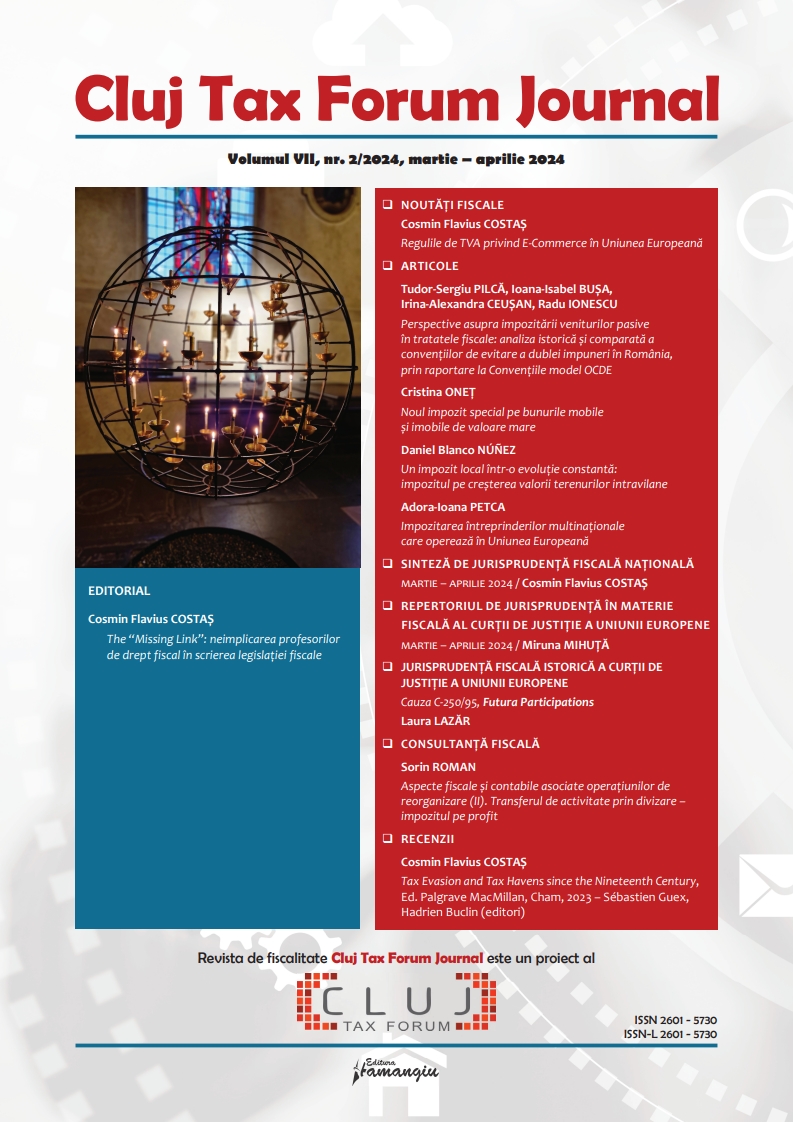PERSPECTIVE ASUPRA IMPOZITĂRII VENITURILOR PASIVE ÎN TRATATELE FISCALE: ANALIZA ISTORICĂ ȘI COMPARATĂ A CONVENȚIILOR DE EVITARE A DUBLEI IMPUNERI ÎN ROMANIA, PRIN RAPORTARE LA CONVENȚIILE MODEL OCDE
PERSPECTIVES ON THE TAXATION OF PASSIVE INCOME IN TAX TREATIES: HISTORICAL AND COMPARATIVE ANALYSIS OF DOUBLE TAXATION AVOIDANCE AGREEMENTS IN ROMANIA, WITH REFERENCE TO OECD MODEL CONVENTIONS
Author(s): Tudor-Sergiu Pilcă, IOANA-ISABEL BUȘA, IRINA-ALEXANDRA CEUȘAN, RADU IONESCUSubject(s): Politics / Political Sciences, Politics, Law, Constitution, Jurisprudence, Public Law, Fiscal Politics / Budgeting, Administrative Law
Published by: Editura Hamangiu S.R.L.
Keywords: Romanian tax treaty policy; Romanian DTAs; OECD Model Tax Convention; UN Model Tax Convention; Taxation of income from immovable properties (Art. 6 OECD Model);
Summary/Abstract: In the increasingly interconnected global economy, nations strive to establish clear and efficient international tax policies. Romania, a European Union member state since 2007, is no exception. While not a formal member of the Organization for Economic Cooperation and Development (OECD), Romania has nonetheless found the OECD Model Tax Convention 2017 a valuable tool in guiding its international tax framework, throughout the decades. This article represents the first part of an in-depth analysis of the development of Romania’s policy on tax treaties, from the perspective of passive income taxation. Using comparative-narrative analysis methods and quantitative data analysis, the double taxation-avoidance agreements concluded by Romania with 86 states and 14 renegotiated treaties were examined, in order to establish fiscal policy trends. The document provides an introduction to the historical, economic and geopolitical context that defined Romania’s domestic and international fiscal policies, as well as the impact of Romania’s involvement in the Council for Mutual Economic Aid. Differences in the regulation of passive income are highlighted by data tables, comparing the communist and post-communist periods. The analysis includes graphical tables for highlighting general geopolitical trends and trends in renegotiated agreements. Moreover, the study analyzes the treaties concluded by Romania regarding the taxation of income from immovable property (art. 6 of the OECD Model Convention) as well as the income from dividends (article 10 of the OECD Model Convention). The analysis of these articles is carried out by referencing the definitions given by the Romanian legislator, correlated with the domestic and international doctrine, as well as the OECD and UN Model Conventions, over time.
Journal: Cluj Tax Forum
- Issue Year: VII/2024
- Issue No: 2
- Page Range: 95-112
- Page Count: 18
- Language: Romanian
- Content File-PDF

